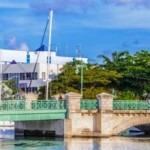Sustainable Energy Transition Essential
Many SIDS have little or no access to modern and affordable energy sources, and energy prices are among the highest globally. In some cases, electricity cost is 500 per cent more than in the US, primarily as a result of the dependence on imported petroleum fuels.
Consequently, the energy sector in the vast majority of SIDS is the principal source of CO2 emissions and economic vulnerability. Power generation consumes in excess of 50 million barrels of petroleum annually to provide 90 per cent of primary energy.
Improving the SIDS power sector requires fossil fuel dependence to be halved by 2035 via a switch to renewable energy sources (ocean, geothermal, solar, wind and biofuels). Caribbean Community Countries estimate the shift could cost tens of billions of US dollars. Transportation, meanwhile, consumes in excess of 100 million barrels of fuel annually. Reducing this by 25 percent by 2035 will require new technologies, infrastructure and financial support.
At the same time, individual countries have embarked on projects to improve energy efficiencies:
- In the Pacific, the national energy policies of Fiji and Vanuatu promote the production of biofuels through planting on degraded lands;
- In Fiji, Solomon Islands, Samoa and Vanuatu, hydropower is increasingly being used for electricity production;
- In Barbados and Antigua, the government has provided subsidies to encourage the use of solar water heaters;
- Commercial biomass has become an important source of renewable energy in many SIDS, mostly as a spin-off from sugarcane production.
Small-Scale Fisheries and Aquaculture
Fisheries play a significant role in the economy, livelihoods and food security of SIDS, who hold jurisdiction over coastal waters and open seas many times larger than their land mass. Fisheries-generated GDP in some SIDS is estimated at up to 12 per cent of the total. Fish consumption in the Pacific SIDS accounts for 50-90 per cent of animal protein in the diet of coastal communities, while national fish consumption can be as much as 3-4 times higher than the global average per capita.
Climate change is anticipated to indirectly affect fisheries in SIDS, as changing water temperature impacts negatively on coral reefs and mangroves that function as nurseries, habitats and foraging grounds for fish. Associated shifts in migratory patterns of fish species are expected to affect availability.
Other threats to fisheries include: pollution, habitat loss and alteration, destructive harvesting methods, over-exploitation, invasive species and natural disasters. Amid those challenges, the fisheries sector is expected to meet the demands of a growing population.
A “green economy” fishery sector is one that is ecologically sustainable, provides a higher level of economic goods and services at lower environmental costs and equitably distributes those benefits. Transitioning to a green economy will require introducing specific measures for policy planning and institutional reform, sustainable financing, investment in technology and building public awareness.
Greening the Tourism Sector
For more than half of the SIDS, tourism is their largest source of foreign exchange and tourism receipts represent more than 30 per cent of their total exports. In comparison, the average for the world is just over 5 per cent, according to World Bank estimates.
Climate change presents one of the most significant challenges to the sector. Rising sea levels can cause loss of land along coastlines of low-lying islands, disrupting economies and livelihoods. Climate change may cause coral bleaching to become an annual occurrence causing further losses in revenue. Dominica has reported that 50 per cent of its corals are bleached, and coral bleaching in Tobago affected an average of 66 per cent of its hard corals in 2005 alone.
The tourism industry is a major consumer of both energy and water. Given that most SIDS import their energy supplies and face challenges with regard to water availability and quality, investment in greening tourism is vital to reducing additional burdens placed on related sectors.
The tourism industry should be one of the lead industries in the promotion of green initiatives, being both an industry dependent on natural resources and a major contributor to employment and economic growth. Greening tourism requires a shift across the entire industry to the implementation of policies, practices and programmes that embrace sustainability with a focus on the conservation of natural resources, transitioning towards renewable energy, reduction of water consumption, and generating income for local communities.
Towards an Inclusive Green Economy
The overall goals of a green economy are supportive of the sustainable development concept, which has as its main objectives development and poverty eradication predicated on the sustainable use of environmental resources. It is vital that the right enabling conditions are provided to generate and stimulate both public and private sector investments that incorporate broader environmental and social criteria.
Several recommendations have been presented for enabling the transition to an inclusive green economy, including: increasing public investment in Green Economy activities, developing market-based instruments, revising legislative and regulatory frameworks, and enhancing institutional capacity. Economic valuation of environmental capital and social equity underpins the capacity of policy makers to make balanced policy choices in pursuit of sustainable development.















